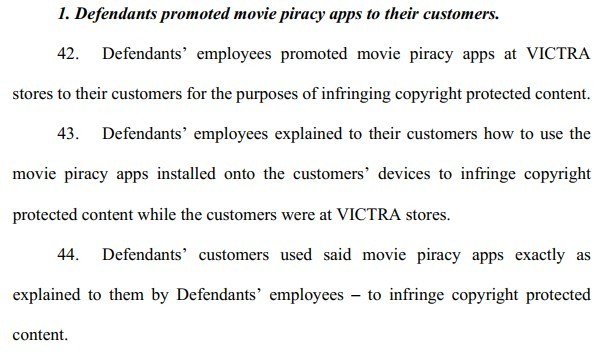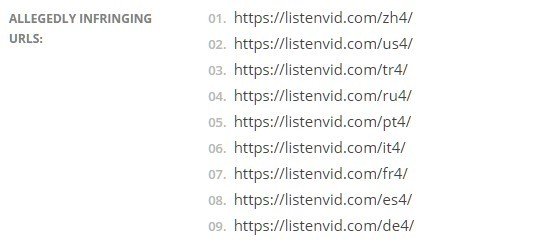When mainstream piracy was in its infancy two decades ago, the majority of file-sharers had no idea that they were even at risk from snoopers. Thanks to a massive wave of lawsuits from the RIAA in 2003, that perception soon changed. Somewhere around 2004, the MPAA embarked on a parallel campaign to drive the message […]

The US Government launched this official review following complaints from the International Intellectual Property Alliance (IIPA).
The coalition of prominent rightsholder groups, including the MPA and RIAA, informed the USTR that they’re not happy with how South Africa addresses copyright issues. Lacking enforcement of online piracy was prominently mentioned, as well as the country’s approach towards fair use.
The fair use angle has triggered a wide range of responses from stakeholders who sent their thoughts to the USTR a few days ago.
South Africa plans to introduce a fair use provision into law that is largely based on the US model. According to the IIPA, this is dangerous, as the country can’t rely on 150 years of existing case law. In addition, the new provisions are even broader than the US variant while they arrive on top of the existing ‘fair dealing’ system, the group warns.
The public submissions show that several rightsholders are siding with IIPA, but there’s also overwhelming pushback from public interest groups, organizations, and legal experts.
Pretty much all critics of the IIPA’s stance explain that South Africa’s fair use proposal is largely the same as the US model. The problems signaled by the IIPA are overblown, they argue, adding that South Africans should enjoy the same freedoms as Americans.
There’s not enough space to highlight all protests, but we will provide a short overview of some of the opposition’s responses.
The Internet Association, which represents many large technology companies including Amazon, Google, Microsoft, and Spotify, strongly urges the USTR to reject the IIPA’s fair use complaints.
“South Africa’s fair use measure is modeled on U.S. law and includes a standard four-factor test that strikes an appropriate balance between the interests of authors, creators, and users,” the Internet Association writes.
“If the U.S. does not stand up for the U.S. copyright framework abroad, then U.S. innovators and exporters will suffer, and other countries will increasingly misuse copyright to limit market entry.”
Wikipedia’s parent company Wikimedia also chimes in. The organization stresses that fair use has allowed US creators and consumers broader access to knowledge. The South African fair use proposal is very similar and by no means a threat, they add.
“While we respect the need to ensure that copyrighted works are properly protected abroad, the reasonable exceptions and limitations included in the draft amendments to South African copyright law are not going to erode that protection any more than the century-long tradition of fair use has in the United States.
“[]It makes little sense to prevent South African citizens from the freedoms that have long been held by citizens in our own country,” Wikimedia notes.
The African Library and Information Associations and Institutions (AfLIA) stresses than many countries have been able to enjoy fair use for decades. Not allowing South Africans the same right is a breach of constitutional rights.
“A developing country like South Africa, that wants to improve its copyright law by modeling it on the US copyright law and other progressive copyright regimes, should be encouraged and affirmed, not punished for doing so,” AfLIA writes, urging the USTR to stop its review.
The International Federation of Library Associations and Institutions (IFLA) agrees with the other opponents. The group compared the US and South African fair use texts and found “no substantive differences.”
Any additional exceptions in the South African proposal follow the model that already exists in US copyright law and can draw on existing jurisprudence, the IFLA adds.
Peter Jaszi, Emeritus Professor of Law at the American University’s Washington College of Law, sees no roadblocks for the fair use proposal either.
“It seems anomalous that the creative industries in a country where fair use is a venerable part of the law would object to another nation’s decision to adopt it as part of an effort to promote domestic innovation,” Jaszi says.
Finally, the South African government is not being swayed by the IIPA’s concerns either. In its submission, it cites other US businesses, including Google, that support its plans. In addition, South Africa stresses that it has a widely-respected tradition of judicial competence and independence when it comes to intellectual property law.
A complete overview of all the responses, including those in favor of the IIPA, is available here. The USTR will take these into account when it makes it final decision on any possible trade sanctions or other recommendations.
Source: TF, for the latest info on copyright, file-sharing, torrent sites and more. We also have VPN reviews, discounts, offers and coupons.
Kodi at FOSDEM 2020
Hello Belgium once again.
In the tradition of the last few years, members of Team Kodi will be present at FOSDEM in Brussels this weekend. If you live somewhere nearby or are attending, please feel free to come and meet some of our team members in person.
FOSDEM is an annual, volunteer-driven, non-commercial event that focuses on free and open source software development. It’s primarily aimed at developers, although the talks and stands are open to anyone who’s interested. Its main aim is to simply create a meeting place; it’s a fantastic opportunity for people to mix, chat, share ideas, collaborate, promote awareness, and generally interact with like-minded individuals.
Every year, thousands of developers from all over the world descend on the Université Libre de Bruxelles to attend. This year, there will be representatives of projects such as Gnome, Mozilla, Debian, GitLab, LibreOffice, Apache – and of course some of the Kodi team as well. We won’t have a stand this time, but in between attending talks and generally mingling, we’d love to meet with our friends in the community who might be reading this.
Kodi Team Meet and Greet
It doesn’t matter whether you’re a user or developer, whether you work with Kodi or something else, if you have commercial interests, or if you’re simply curious. Pop along if you’re interested; several Team Kodi members will be present to chat at your leisure.
Room J.1.106, Sunday 2nd February, 12:00-13:00.

In addition to this Content-ID system, copyright holders can also submit manual takedown notices to remove infringing content.
Both routes have led to abuse in the past, resulting in takedowns of perfectly legitimate videos. This is particularly worrying for channel owners, as these allegations can potentially lead to multiple copyright strikes after which YouTube removes the entire account.
Over the years we have covered takedown mishaps in great detail. However, this week we learned something new. As it turns out, copyright holders also have the ability to remove content that doesn’t exist yet. A preemptive copyright strike, so to speak.
This unusual takedown strategy was revealed by Matt Binder, a reporter at Mashable who hosts a podcast named DOOMED, which is also live-streamed through YouTube.
Earlier this month, Binder scheduled a show discussing CNN’s Democratic candidates’ debate with progressive activist Jordan Uhl. The show was recorded after the broadcast and in preparation Binder scheduled the podcast’s livestream on YouTube, with “post-Democratic debate” in the title.
Many creators use this scheduling feature to announce their upcoming live streams. What’s new, however, is that Binder’s scheduled stream was removed before it even started. In other words, the content was deemed to be infringing before it existed.
Binder documented the unusual episode on Mashable where he also reveals that the takedown notice was issued on behalf of Warner Bros. Entertainment, which owns CNN.
“The notice informed me that I had received a copyright strike for my scheduled stream,” Binder writes, noting that YouTube immediately restricted his ability to stream content live.
“That one copyright strike was enough to disable livestreaming on my channel for the strike’s three-month duration. If I were to accumulate three strikes, YouTube would just shut down my channel completely, removing all of my content,” Binder adds.
Apparently, Warner Bros. and CNN were monitoring streams that could potentially infringe on their right to broadcast the Democratic candidate’s debate. Based on the title alone, they mistakenly concluded that Binder’s stream was going to be illegal, which it clearly wasn’t.
To correct the mistake Binder protested the takedown notice, hoping that it would be swiftly reversed. However, his first request was denied because it was unclear if he had a valid reason to file a counter-notification.
As a reporter, Binder followed up the story and reached out directly to YouTube, informing the company that he planned to write about the issue. That worked, as the mistake was soon corrected and the copyright strike disappeared as well.
One has to wonder, however, if the average Joe would be able to achieve the same result. In any case, it seems off that copyright holders can claim copyright infringement on content that has yet to be created.
We previously reported that Google search allows rightsholders to remove infringing URLs that are not yet indexed by the search engine. Binder’s case is similar but goes a step further as the allegedly infringing content didn’t exist when the stream was taken down.
YouTube constantly has to balance the interests of its users and those of copyright holders. It’s likely that the option to preemptively strike live streams is used to make it easier to take down scheduled broadcasts of sports games or other time-sensitive major broadcasts.
While this preemptive takedown option may be useful, Binder’s example shows that these powers can also lead to overblocking, which can seriously hurt legitimate content creators.
Source: TF, for the latest info on copyright, file-sharing, torrent sites and more. We also have VPN reviews, discounts, offers and coupons.

The anti-circumvention provisions of the DMCA allow companies that own or provide access to copyrighted works to target tools and systems that facilitate access to that content in an unauthorized manner. Recent examples can be found in the war currently being waged by the RIAA against various YouTube-ripping sites, which provide illicit access to copyright works, according to the industry group.
This week Facebook-owned Instagram entered the arena when it filed a DMCA notice against code repository Github. It targeted Instagram-API, an independent Instagram API created by a Spain-based developer known as ‘mgp25‘. Instagram claims that at least in part, the notice was filed to prevent unauthorized access to its users’ posts, which can contain copyrighted works.
“The Company maintains technological measures to control access to and protect Instagram users’ posts, which are copyrighted works. This notice relates to GitHub users offering, providing, and/or trafficking in technologies, products, and/or services primarily designed to circumvent the Company’s technological measures,” the complaint begins.
According to Instagram, Instagram-API is code that was designed to emulate the official Instagram mobile app, allowing users to send and receive data, including copyrighted content, through Instagram’s private API. It’s a description that is broadly confirmed by the tool’s creator.
“The API is more or less like a replica of the mobile app. Basically, the API mimics the requests Instagram does, so if you want to check someone’s profile, the mobile app uses a certain request, so through basic analysis we can emulate that request and be able to get the profile info too. The same happens with other functionalities,” mgp25 informs TorrentFreak.
While Instagram clearly views the tool as a problem, mgp25 says that it was originally created to solve one.
“Back in the day I wasn’t able to use Instagram on my phone, and I wanted something to upload photos and communicate with my friends. That’s why I made the API in the first place,” he explains.
There are no claims from Instagram that Instagram-API was developed using any of its copyrighted code. Indeed, the tool’s developer says that it was the product of reverse-engineering, something he believes should be protected in today’s online privacy minefield.
“I think reverse engineering should be exempt from the DMCA and should be legal. By reverse engineering we can verify whether apps are violating user privacy, stealing data, backdooring your device or doing even worse things,” he says.
“Without reverse engineering we wouldn’t know whether the software was a government spy tool. Reverse engineering should be a right every user should have, not only to provide interoperability functionalities but to assure their privacy rights are not being violated.”
While many would consider that to be a reasonable statement, Instagram isn’t happy with the broad abilities of Instagram-API. In addition to the above-mentioned features, it also enables access to “Instagram users’ copyrighted works in manners that exceed the scope of access and functionality that would be permitted by a user with a legitimate, authorized Instagram account,” the company adds.
After the filing of the complaint, it took a couple of days for Github to delete the project but it is now well and truly down. The same is true for more than 1,500 forks of Instagram-API that were all wiped out after their URLs were detailed in the same complaint.
Regardless of how mgp25 feels about the takedown, the matter will now come to a close. The developer says he has no idea how far Instagram and Facebook are prepared to go in order to neutralize his software so he won’t be filing a counter-notice to find out.
Source: TF, for the latest info on copyright, file-sharing, torrent sites and more. We also have VPN reviews, discounts, offers and coupons.

The United States-Mexico-Canada Agreement (USMCA) will accommodate changes in trade that the three countries have witnessed over the years, especially online.
After the US Senate passed the legislation earlier this month, President Trump has now signed the new text into law. Replacing NAFTA with a better deal was one of the President’s election promises, which is now fulfilled.
The USMCA covers a wide range of trade topics including copyright and anti-piracy enforcement. On the copyright side, the deal doesn’t bring much change to US law. However, the new deal does require Mexico and Canada to revise some of their policies.
For example, USMCA requires all countries to have a copyright term that continues for at least 70 years after the creator’s death, which is already the case in the US.
For Canada, however, this means that the country’s current copyright term must be extended by 20 years. This won’t happen instantly, as the country has negotiated a transition period to consult the public on how to best meet this requirement. In the long term, an extension seems inevitable though.
Another controversial subject that was widely debated by experts and stakeholders is the DMCA-style ‘safe harbor’ text. In the US and under certain conditions, ISPs are shielded from copyright infringement liability under the safe harbor provisions of the DMCA and the new deal expands this security to Mexico and Canada.
This safe harbor expansion is welcomed by many large technology companies including Internet providers and hosting platforms. However, many major entertainment industry companies and rightsholder groups are not happy, as they are trying to get rid of these broad safe harbor policies.
The Directors Guild of America previously said it was “deeply disappointed” that the new USMCA deal will export the “flawed and outdated United States policy” that allows online services to “shirk responsibility for copyright violations.”
Last year the House Judiciary Committee also urged the US Trade Representative not to include any safe harbor language in trade deals while the Copyright Office is reviewing the effectiveness of the DMCA law, but without result.
That said, the USMCA’s safe-harbor language also comes with obligations for online services. The agreement specifically mentions that ISPs must take down pirated content and implement a repeat infringer policy if they want to apply for safe harbor protection. This is largely modeled after the DMCA law.
The safe harbors for copyright infringement and the takedown requirements don’t apply to Canada as long as it continues to rely on its current notice-and-notice scheme. However, the country will enjoy safe harbors for other objectionable content, modeled after section 230 of the US Communications Decency Act.
Despite criticism from many copyright holder groups, the Motion Picture Association (MPA) is happy that the new trade agreement is now law.
“USMCA will help facilitate the growth of the legal digital market for creative content while addressing the multi-billion dollar threat of online piracy,” MPA’s CEO Charles Rivkin comments.
While Trump has signed the USMCA into law, Mexico and Canada have yet to follow. Canada started this process yesterday when Deputy Prime Minister Chrystia Freeland
introduced the USMCA implementation bill.
Source: TF, for the latest info on copyright, file-sharing, torrent sites and more. We also have VPN reviews, discounts, offers and coupons.

As previously reported, communication issues with the registry led to the domain expiring and it was quickly snapped up by Kalin Karakehayov, an expired domain specialist.
Dotcom informed TF that the project’s lawyers filed a complaint with the domain registrar in the hope that the domain would be returned. Indeed, following a review process completed around two weeks ago, the .IM registry determined that since the registration by Karakehayov had been abusive, the domain should be transferred back to the K.im project.
On the day the decision was handed down, Karakehayov told TF that he intended to appeal. However, just two weeks later it now appears that peace has broken out.
“After getting to know the people behind k.im, we have agreed to a small, cost-covering settlement to save mutual legal expenses and downtime of their project,” Karakehayov told us via email.
“They were very fair in its implementation that due to time constraints was based on pure trust from both sides. We’re on good terms and I wish all the best for their project.”
With the domain now apparently back in the hands of the K.im project, TorrentFreak caught up with Kim Dotcom who informs us that he didn’t personally speak to Karakehayov but the end result is welcome.
“We are happy to have the domain back,” he says. “We are aiming to release K.im this year and I’m confident that millions of users will love it. We are changing how commerce is done on the Internet for the benefit of all. You can expect some whining from the established monopolies.”
While Dotcom is pleased that this latest roadblock has been overcome, the New Zealand-based entrepreneur has bigger issues to deal with. Specifically, a Supreme Court judgment that will decide whether he and his former Megaupload colleagues will be extradited to the United States to face copyright infringement, racketeering, and money laundering charges – not to mention the possibility of decades in prison.
The Supreme Court hearing took place in June 2019 after several lower courts had determined that Dotcom, Mathias Ortmann, Bram van der Kolk, and Finn Batato can be sent to the United States to face justice. The defendants are hoping that the Supreme Court will decide to the contrary.
Dotcom informs TorrentFreak that he doesn’t have a date for the judgment but he’s nevertheless looking forward to “dissecting the judgment with the best legal minds.” That being said, he isn’t optimistic that the decision will go in his favor.
“I expect a 3:2 majority in favor of extradition because three of the five judges were appointed by the National Party and the former Attorney General who was responsible for the actions taken against me in New Zealand. This is a political case and it will most likely be a political judgment,” he says.
“The law in New Zealand couldn’t be more favorable for me so the judgment will probably be a hack of the law for the history books.”
While another adverse ruling would represent a significant setback for Dotcom, he maintains that the battle against extradition is far from over.
“The process doesn’t end with this judgment (unless I win) and Crown Law suggested at the start of the hearing that we could be fighting for another seven years until any finality is achieved,” he concludes.
If that timeline of events plays out, it will have been 15 years since the shuttering of Megaupload and the raid on Dotcom, his twins born in 2012 will be almost ready to leave school, and at least two US presidents will have come and gone.
Source: TF, for the latest info on copyright, file-sharing, torrent sites and more. We also have VPN reviews, discounts, offers and coupons.

In recent years copyright holders have tried to tackle the problem, both in and outside of court.
Hawaiian attorney Kerry Culpepper has been particularly active on the legal front. Representing several affiliated movie companies, he has gone after users, site operators and developers connected to YTS, Popcorn Time, Showbox, and Cotomovies.
In a new lawsuit, filed at a Hawaiian federal court, Culpepper addresses another element of the piracy distribution chain. Representing Hunter Killer Productions, the attorney has filed a complaint against the phone store chain Victra.
The movie company accuses AKA Wireless and ABC Phones, who do business as Victra, of inducing and contributing to copyright infringement. Specifically, the complaint alleges that Victra employees promoted the piracy apps Popcorn Time and Showbox to customers.
“Defendants’ employees explained to their customers how to use the movie piracy apps installed onto the customers’ devices to infringe copyright protected content while the customers were at VICTRA stores.
“Defendants promoted the movie piracy apps to their customers to entice them to purchase particular products and thereby increase their profit,” Hunter Killer Productions claims.
The movie company mentions two instances where a Victra employee promoted a pirate app in store. This happened in Verizon-branded stores in El Paso, Texas, and Kahului, Hawaii.
The complaint is supported by a declaration from a customer who was caught pirating. He mentions that an employee named Sabrina installed “Popcorn Time” on a tablet he bought. She also explained how to use it to watch free movies, without mentioning that it’s a piracy app.
“Sabrina never informed me that Popcorn Time was illegal. Because Sabrina worked for VICTRA, I assumed that Popcorn Time was a legitimate platform for watching Copyright protected content like Netflix and was part of the promotion,” the customer writes.
As mentioned in the complaint, this is not the first time that Victra has been made aware of this issue. Two years ago, the phone store chain was sued by two other movie companies, which accused it (and its employee) of doing pretty much the same.
That case, which mentions the same alleged offense by an employee of the Kahului store, was eventually dismissed after a settlement was reached. The details of this agreement were not made public.
According to Hunter Killer Productions, Victra profited from the actions of its employees as they led to an increase in sales. The employees are not listed as defendants, but the movie company is holding the phone store liable.
“The intentional inducement and contributory infringement occurred within the scope of their employment,” the movie company writes, adding that Victra is therefore liable for these actions.
Hunter Killer Productions requests either actual damages or statutory damages, to compensate its claimed losses. However, considering the legal track record of the movie company, it is likely that this case will eventually be settled for an undisclosed amount.
—
A copy of the complaint filed by Hunter Killer Productions against Victra is available here (pdf).
Source: TF, for the latest info on copyright, file-sharing, torrent sites and more. We also have VPN reviews, discounts, offers and coupons.

Instead of the usual DMCA copyright notices, the music group asked the search engine to remove various URLs for alleged violations of the DMCA’s anti-circumvention provision.
The sites in question circumvent YouTube’s rolling cipher, which is a technical protection measure that protects audio and video from being copied without permission, the RIAA argued. As such, they should be removed from Google’s search results.
This takedown strategy appeared to be quite effective. After taking down the many links to FLVTO, 2Conv, Y2Mate, and Yout, the RIAA expanded its scope to other YouTube rippers. In total, the music group has now targeted thousands of URLs in hundreds of notices.
The upside for the RIAA is that there’s no standard counter-notice option for these requests. So, even when site owners don’t agree with the request, they have no option to protest it. Besides going to court, perhaps.
That doesn’t mean that these operators are sitting idly by while their search traffic is taken away. On the contrary, behind these scenes there’s a full-blown takedown war going on. Or to phrase it less aggressive: a game of takedown whack-a-mole.
Pretty much all of the large YouTube rippers are continuously updating to new URLs, which are not yet taken down by the RIAA. In most cases, new numbers are simply added to the URL. This ensures that their websites continue to show up in Google’s search results.
Take Flvto.biz, for example. People who access the site today will notice that the English homepage redirects to Flvto.biz/en44. However, just a few days ago it used Flvto.biz/en42, and in between, it was accessible through Flvto.biz/en43.
The site keeps updating its URLs to remain visible in Google’s search results. This is indeed needed, as the RIAA continues to send takedown notices similar to the one below.
Many other sites are using the same strategy, which is obvious from new homepages such as 2conv.com/en25, mpgun.com/lang-2en/convert, y2mate.com/en4, ytmp3.cc/en10, savefrom.net/3, and listenvid.com/us4.
The listenvid.com/us4 URL, which is still active at the time of writing, will likely update soon, as the RIAA removed it from Google’s search results just a few hours ago, as can be seen here;
The above clearly shows that many YouTube rippers are not backing down but the RIAA is showing no signs of stopping either. After it started a few months ago, the group’s efforts have only increased. Yesterday alone the RIAA submitted over a dozen notices targeting hundreds of URLs.
The result is a game of whack-a-mole that can potentially continue for years. Unless one side gives up of course.
None of the YouTube rippers we contacted responded to our request for comment. From what we can see, their traffic doesn’t appear to be impacted much. Some have seen a drop in traffic recently, but others witnessed an uptick at the same time. In any case, all the major sites are still findable in Google’s search results.
Source: TF, for the latest info on copyright, file-sharing, torrent sites and more. We also have VPN reviews, discounts, offers and coupons.

Red Notices detail people who are wanted internationally for serious crimes, typically murder, rape, child abuse or armed robbery, according to Interpol. However, South Korean authorities state that since serious copyright infringers can be jailed for significant periods, those with an arrest warrant filed against them can now be pursued internationally.
“Previously, it was not possible to investigate copyright infringers residing abroad, so the investigation would have to be temporarily suspended and only the information notified to immigration,” the Ministry says.
“But now, with a long period of two years in prison or in jail, a copyright infringer with an arrest warrant has been redeemed with the cooperation of the International Criminal Police Agency (Interpol) to arrest the wanted person and lead him to the country.”
The name of the suspect hasn’t been released publicly but the Ministry of Culture states that they want their Interpol partners to apprehend the operator of a torrent site (simply referred to as ‘torrent—‘) that offered around 455,000 titles illegally and generated around 15 million visits per month. The only other detail is that the person is Australian and residing overseas.
In its announcement, the Ministry of Culture revealed recent progress in its battle against large scale copyright infringers who allegedly distribute copyright works using overseas servers. After closing 25 sites in 2018, police say they arrested nine site operators in 2019, arrested a further six, and closed 20 illicit platforms.
Those arrested include three detained for distributing 5,000 comic works and 20,000 pornography titles on sites utilizing overseas servers, plus two who “earned advertising revenues” by posting 100,000 comic works on foreign sites.
In parallel, the Korea Communications Commission and the Korea Copyright Protection Office under the Ministry of Arts and Culture have been working closely to improve the country’s site-blocking mechanism. In common with other regions around the world, alternative domains, proxies and mirrors that quickly spring up after domains are blocked have been receiving special attention.
As part of the overall crackdown, the National Police Agency is reportedly investigating gambling sites that place banner advertising on ‘pirate’ platforms while encouraging international cooperation against infringement, including strengthening ties with service providers and copyright authorities, plus Google.
Source: TF, for the latest info on copyright, file-sharing, torrent sites and more. We also have VPN reviews, discounts, offers and coupons.






